Unit 6 知识点总结(含短语+句型+精讲+作文)2024-2025学年人教版八年级上册英语
文档属性
| 名称 | Unit 6 知识点总结(含短语+句型+精讲+作文)2024-2025学年人教版八年级上册英语 | 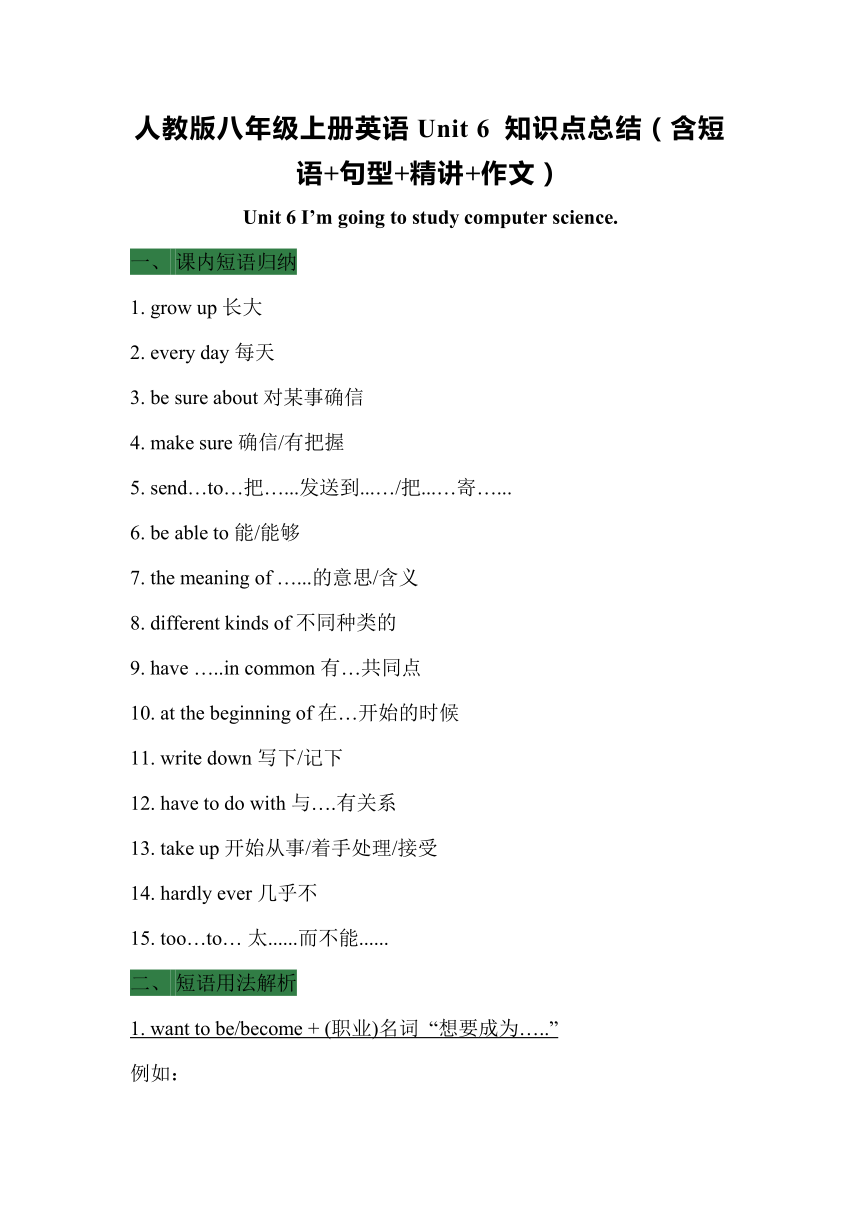 | |
| 格式 | docx | ||
| 文件大小 | 35.2KB | ||
| 资源类型 | 教案 | ||
| 版本资源 | 人教新目标(Go for it)版 | ||
| 科目 | 英语 | ||
| 更新时间 | 2024-10-05 21:17:38 | ||
图片预览

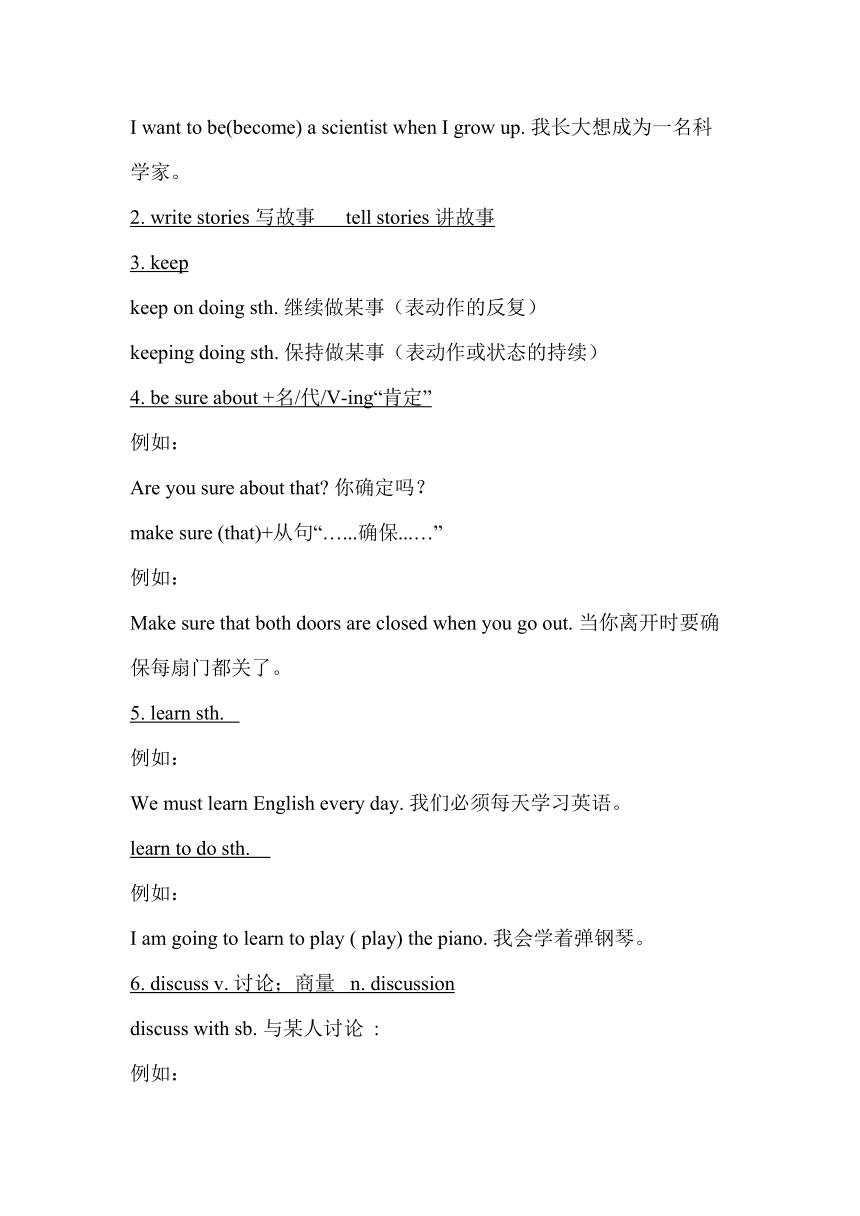
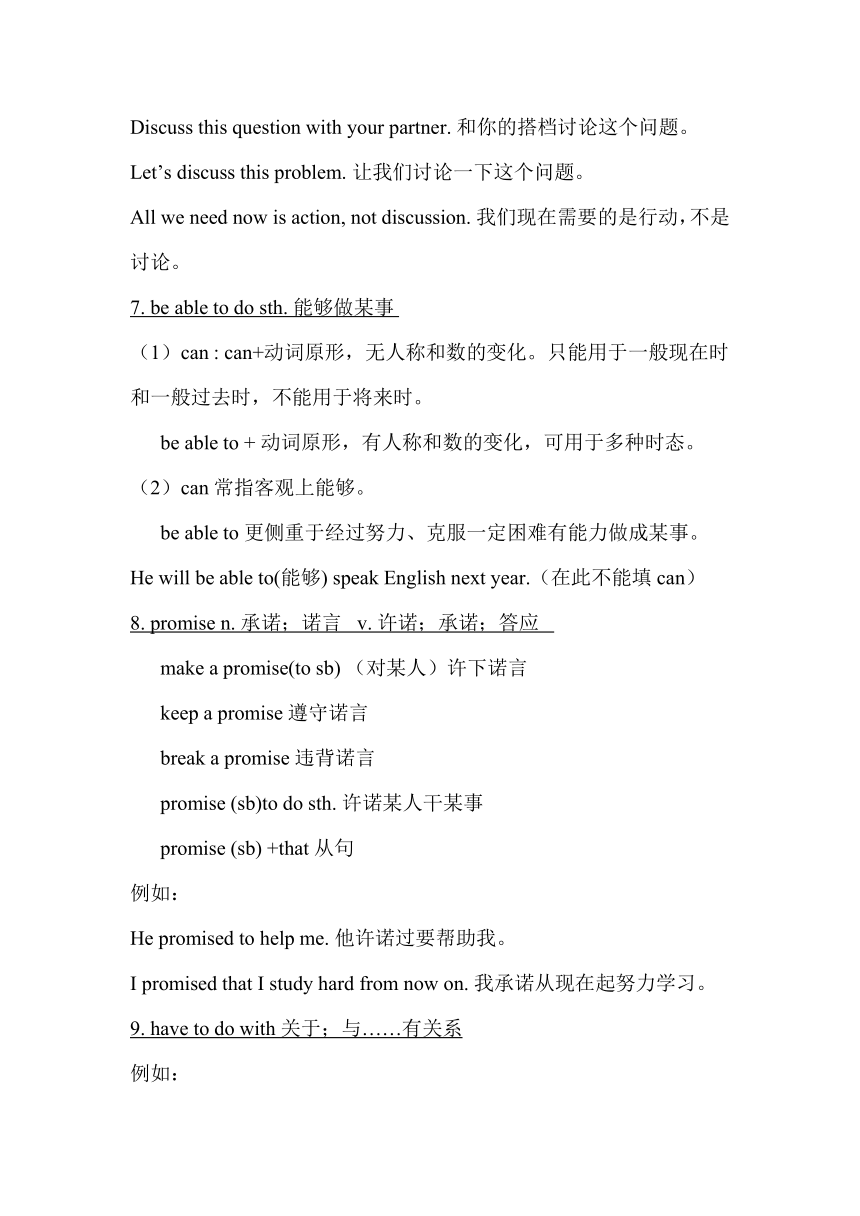
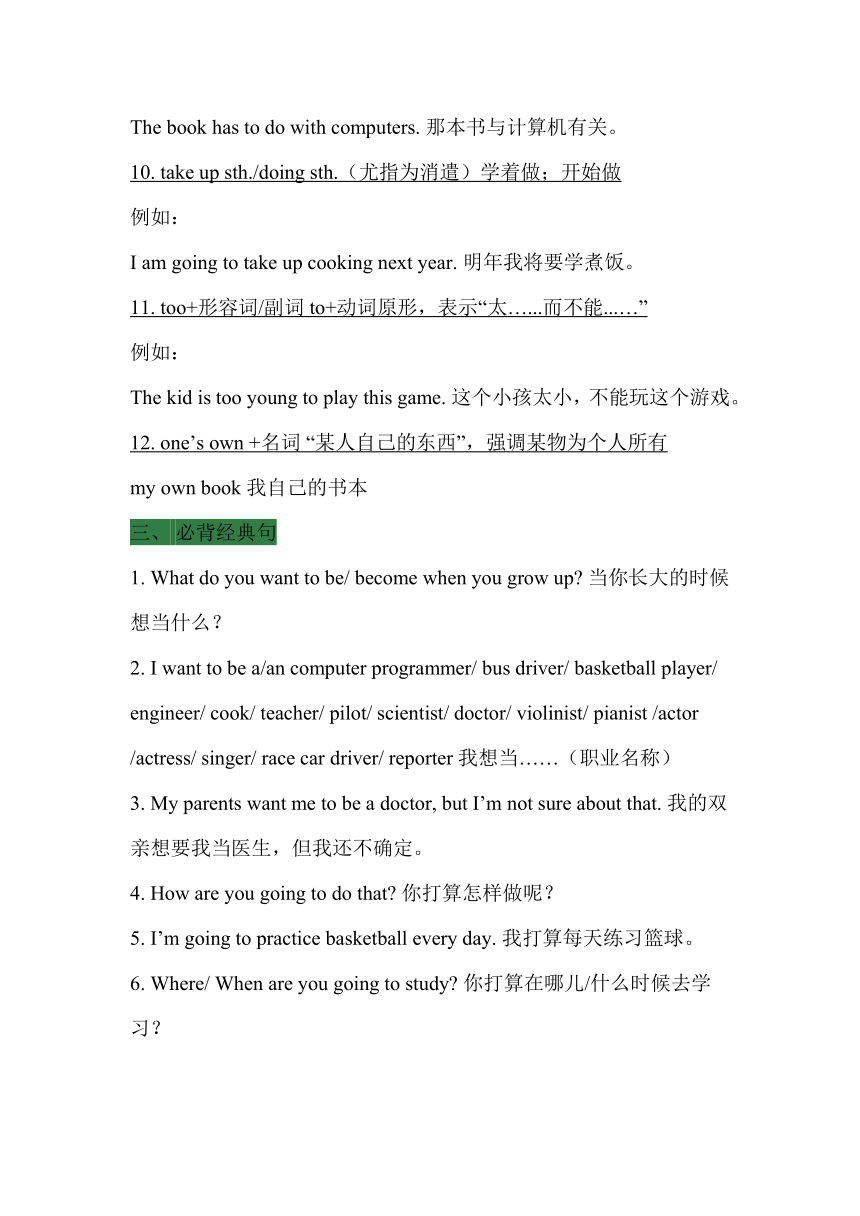
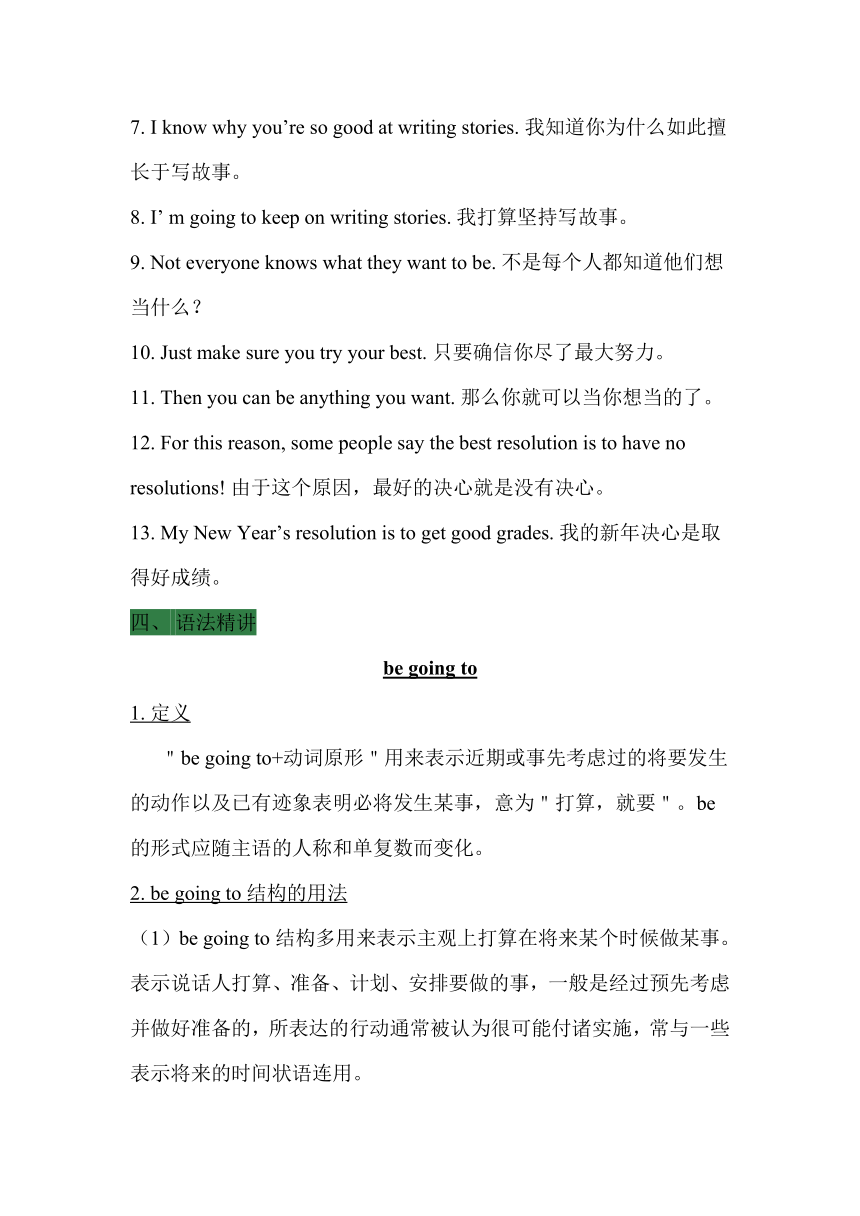
文档简介
人教版八年级上册英语Unit 6 知识点总结(含短语+句型+精讲+作文)
Unit 6 I’m going to study computer science.
一、 课内短语归纳
1. grow up 长大
2. every day 每天
3. be sure about 对某事确信
4. make sure 确信/有把握
5. send…to…把…...发送到...…/把...…寄…...
6. be able to 能/能够
7. the meaning of …...的意思/含义
8. different kinds of 不同种类的
9. have …..in common 有…共同点
10. at the beginning of 在…开始的时候
11. write down 写下/记下
12. have to do with 与….有关系
13. take up 开始从事/着手处理/接受
14. hardly ever 几乎不
15. too…to… 太......而不能......
二、 短语用法解析
1. want to be/become + (职业)名词 “想要成为…..”
例如:
I want to be(become) a scientist when I grow up. 我长大想成为一名科学家。
2. write stories 写故事 tell stories 讲故事
3. keep
keep on doing sth. 继续做某事(表动作的反复)
keeping doing sth. 保持做某事(表动作或状态的持续)
4. be sure about +名/代/V-ing“肯定”
例如:
Are you sure about that 你确定吗?
make sure (that)+从句“…...确保...…”
例如:
Make sure that both doors are closed when you go out. 当你离开时要确保每扇门都关了。
5. learn sth.
例如:
We must learn English every day. 我们必须每天学习英语。
learn to do sth.
例如:
I am going to learn to play ( play) the piano. 我会学着弹钢琴。
6. discuss v. 讨论;商量 n. discussion
discuss with sb. 与某人讨论 :
例如:
Discuss this question with your partner. 和你的搭档讨论这个问题。
Let’s discuss this problem. 让我们讨论一下这个问题。
All we need now is action, not discussion. 我们现在需要的是行动,不是讨论。
7. be able to do sth. 能够做某事
(1)can : can+动词原形,无人称和数的变化。只能用于一般现在时和一般过去时,不能用于将来时。
be able to + 动词原形,有人称和数的变化,可用于多种时态。
(2)can 常指客观上能够。
be able to 更侧重于经过努力、克服一定困难有能力做成某事。
He will be able to(能够) speak English next year.(在此不能填can)
8. promise n. 承诺;诺言 v. 许诺;承诺;答应
make a promise(to sb) (对某人)许下诺言
keep a promise 遵守诺言
break a promise 违背诺言
promise (sb)to do sth. 许诺某人干某事
promise (sb) +that 从句
例如:
He promised to help me. 他许诺过要帮助我。
I promised that I study hard from now on. 我承诺从现在起努力学习。
9. have to do with 关于;与……有关系
例如:
The book has to do with computers. 那本书与计算机有关。
10. take up sth./doing sth.(尤指为消遣)学着做;开始做
例如:
I am going to take up cooking next year. 明年我将要学煮饭。
11. too+形容词/副词 to+动词原形,表示“太…...而不能...…”
例如:
The kid is too young to play this game. 这个小孩太小,不能玩这个游戏。
12. one’s own +名词 “某人自己的东西”,强调某物为个人所有
my own book 我自己的书本
三、 必背经典句
1. What do you want to be/ become when you grow up 当你长大的时候想当什么?
2. I want to be a/an computer programmer/ bus driver/ basketball player/ engineer/ cook/ teacher/ pilot/ scientist/ doctor/ violinist/ pianist /actor /actress/ singer/ race car driver/ reporter 我想当……(职业名称)
3. My parents want me to be a doctor, but I’m not sure about that. 我的双亲想要我当医生,但我还不确定。
4. How are you going to do that 你打算怎样做呢?
5. I’m going to practice basketball every day. 我打算每天练习篮球。
6. Where/ When are you going to study 你打算在哪儿/什么时候去学习?
7. I know why you’re so good at writing stories. 我知道你为什么如此擅长于写故事。
8. I’ m going to keep on writing stories. 我打算坚持写故事。
9. Not everyone knows what they want to be. 不是每个人都知道他们想当什么?
10. Just make sure you try your best. 只要确信你尽了最大努力。
11. Then you can be anything you want. 那么你就可以当你想当的了。
12. For this reason, some people say the best resolution is to have no resolutions! 由于这个原因,最好的决心就是没有决心。
13. My New Year’s resolution is to get good grades. 我的新年决心是取得好成绩。
四、 语法精讲
be going to
1. 定义
"be going to+动词原形"用来表示近期或事先考虑过的将要发生的动作以及已有迹象表明必将发生某事,意为"打算,就要"。be的形式应随主语的人称和单复数而变化。
2. be going to结构的用法
(1) be going to结构多用来表示主观上打算在将来某个时候做某事。表示说话人打算、准备、计划、安排要做的事,一般是经过预先考虑并做好准备的,所表达的行动通常被认为很可能付诸实施,常与一些表示将来的时间状语连用。
例如:
We’re going to pick apples next Wednesday. 我们下周三打算去摘苹果。
Peter is going to be a policeman when he grows up. 彼得长大了打算当警察。
(2) be going to结构用来表示根据主观判断肯定将会发生的事。表示说话人根据目前客观迹象预测某件事情极有可能发生,是说话人确信如此,是指即将发生或肯定要发生的事情。在be sure、be afraid、believe、think 之后都可以这样用。
例如:
Look at the heavy clouds! It’s going to rain. 看那乌云!天要下雨了。
The rain has stopped. The sun is going to come out. 雨停了。太阳就要出来了。
(3) be going to结构用来表示决心、肯定等。
例如:
Lily is going to have her long hair cut. 莉莉要把她的长发剪掉。
But it’s going to be a very tiring year for me. 但是对我来说,这肯定是非常累人的一年。
(4) be going to结构也可用来表示即将发生的事。
例如:
The plane is going to take off in ten minutes. 飞机将在十分钟后起飞。
(5) be going to结构后面也能接be动词原形。
例如:
What time is the game going to be 比赛将在什么时候开始?
(6) there be句型的一般将来时的肯定结构为:There is going to be+名词+其他成分,意思是"将要有……"。
例如:
There is going to be a class meeting this week. 这周将有一次班会。
(7) be going to结构后面习惯上不跟go、come等表位移的动词,一般用该动词的进行时形式表示将来。
例如:
We’re going there again next Sunday. 下周日我们要再去那里。
3. be going to的一般疑问句
句型结构:Be动词 + 主语 + going to + 动词原形(+ 其他)
肯定回答:Yes, 主语 + be动词.
否定回答:No, 主语 + be动词 + not.
例如:
—Are you going to go swimming 你打算去游泳吗?
—Yes, I am. 是的,我打算去。
例如:
—Is he going to watch a film on Friday 他打算周五去看电影吗?
—No, he isn’t. 不,他不打算看。
4. be going to的特殊疑问句
询问他人有什么打算时,用特殊疑问句,特殊疑问句分三种情况:
(1) 谈论将要做的事情
句型结构:What is are + 主语 + going to + 动词原形 (+ 其他)
答语:主语 + am is are going to + 动词原形 (+ 其他).
例如:
—What are you going to do this Saturday 这周六你打算做什么?
—I’m going to have a picnic. 我打算去野餐。
(2) 谈论将要去的地方
句型结构:Where is are + 主语 + going (+ 将来时间)
答语:主语 + am is are going to + 地点.
例如:
—Where are you going 你打算去哪儿?
—I’m going to the library. 我打算去图书馆。
(3) 谈论将要做某事的时间
句型结构:When is are + 主语 + going (+ 其他)
答语:将来时间.
例如:
—When are you going to Beijing 你打算什么时候去北京?
—Next week. 下周。
5. 一般将来时的标志词
be going to 表达的是未发生的动作,因此常与一些表示将来的时间状语连用。例如:tomorrow,this evening,next month,in three weeks等。有时也可与when,before,after,until 等引导的时间状语从句连用。
例如:
What is he going to do after he plays football 他踢完足球以后打算做什么?
6. 注意事项
(1) be going to结构可用于表示计划、安排、预测等,但不是唯一表示将来的方式。其他助动词如will、shall也可表示将来时。
(2) be going to结构表示主观打算,而will表示客观将要发生的事情。
例如:
-- I am going to buy a new phone.(我要买新手机。)
-- The train will arrive on time.(火车将准时到达。)
(3) be going to结构可用于表示推测
例如:
It looks like it’s going to rain.(看起来要下雨了。)。
(4) 有些趋向性动词用现在进行时来表将来。
例如:
Go(前往): I am going to the store later. 我稍后要去商店。
Come(来): She is coming to the party tonight. 她今晚要来参加派对。
Arrive(到达): The train is arriving at 9 o'clock. 火车将在九点到达。
Leave(离开): They are leaving for vacation tomorrow. 他们明天要去度假。
Travel(旅行): They are traveling to Europe next month. 他们下个月要去欧洲旅行。
Drive(开车): We are driving to the concert. 我们要开车去演唱会。
五、 重点句子讲解
1. I’m going to practice basketball every day. 我打算每天练习(打)篮球。
(1) practice 及物动词,意为“练习”,后接名词、代词或动词-ing形式作宾语。
例如:
Your elder sister ls practicing the guitar in the room. 你姐姐正在屋子里练习吉他。
You need to practice speaking English every day. 你需要每天练习说英语。
※ 常跟动词-ing 形式作宾语的动词(短语)有:
考虑建议盼原谅(consider, suggest/advise, look forward to,excuse/pardon)
承认推迟没得想(admit, delay/put off, fancy)
免错过继续练(avoid, miss, keep/keep on, practice)
否认完成能欣赏(deny, finish, enjoy/appreciate)
不禁介意与逃走(can’t help, mind, escape)
不准冒险凭想象(forbid, risk, imagine)
(2) every day 意为“每天”,在句中作状语。
例如:
I go to school on foot every day. 我每天步行上学。
※ 辨析 every day与 everyday
every day“每天”,为副词短语,在句中作状语,一般位于句首或句末
everyday”每天的“,为形容词,在句中作定语,一般位于名词前面
例如:
He reads books every day. 每天都看书。
This is our everyday homework. 这是我们每天的家庭作业。
2. My parents want me to be a doctor, but I’m not sure about that. 我的父母想让我成为一名医生,但是我对那还不确定。
be sure about 意为“确信;对..有把握”,与 be sure of同义,后接名词,代词或动词-ing形式,句子主语是人,不能是物。
例如:
He is sure about /of success. 他相信会成功。
This man is sure about/ of living to ninety. 这个人自信会活到 90 岁。
※ 知识拓展
(1) be sure 意为“务必;切记”,用于祈使句中,后接动词不定式,表示说话人向对方提出要求。
例如:
Be sure to give it back to me on time. 务必按时将它还给我.
Be sure to come tomorrow. 明天务必来。
(2) be sure 意为“一定;肯定”,后接动词不定式,表示说话人的推测或判断。主语可以是人也可以是物。
例如:
It’s sure to rain tomorrow. 明天一定会下雨。
My father is sure to live to ninety. 我父亲一定会活到 90 岁。
(3) be sure+that 从句,意为“肯定…;有把握”,主句的主语是人。
例如:
I’m sure smoking Is not good for health. 我相信吸烟对健康不益,
I’m sure that the books are of great use to you. 这些书肯定对你有用处。
3. Not every one knows what they want to be. 不是每个人都知道他们想成为什么。
not everyone 意为“不是每一个人”,是不完全否定形式
例如:
Not everyone likes hamburgers. 不是人人都喜欢汉堡包。
※ 知识拓展
常见的不完全否定形式:
(1) all 的否定式:not all...(或 al...not),意为“并非都..,不是所有的都..
例如:
Not all men can be masters.(=All men cannot be masters.) 并非人人都能当领导。
(2) both 的否定式: not both.(或 both... not),意为“并非两者.....都.”
例如:
I don’t want both the books. 我不是两本书都想要。
Both(the)windows are not open. 两扇窗子并不是都开着。
(3) every的否定式:not every..(或every...not),意为“不是每个.
都...
例如:
Not every book is educational.=Every book is not educational. 不是每本书都有教育意义。
4. Then you can be anything you want! 那么你就能成为你想成为的人了!
本句中的 you want 为定语从句,修饰先行词 anything,定语从句中省略了关系代词 that,that 在定语从句中作动词 want 的宾语,可以省略。
例如:
Do you want to bring anything that we need 你想带一些我们需要的东
西吗
※ 知识拓展
定语从句中关系代词只用 that 而不用 which 或 who 的情况:
(1) 先行词由形容词最高级、序数词以及any,the very,the only,no,just等修饰时。
例如:
This is the most beautiful place that I have been to. 这是我去过的最漂亮的地方。
(2) 先行词既包括人,也包括物时。
例如:
They always like to talk about the men and the things that they see on the road. 他们总是喜欢谈论他们在路上看到的人和物。
(3)先行词是不定代词,如:all,little,few,much,none,anything,,nothing,everything 等时。
例如:
I didn’t understand he words all that he said. 我不理解他说的所有话。
(4) 当主句是以疑问词 who 或 which 开头的特殊疑问句时
例如:
Which is the book that the boy has come to ask for 这个男孩儿来要的是哪一本书
5. Sounds interesting. 听起来很有趣。
sound 连系动词,意为“听起来”,后常接形容词作表语。常见搭配 sound like意为“听起来像”。
例如:
The music sounds very beautiful. 音乐听起来很优美。
Oh, that sounds like a good idea. 哦,那听起来像个好主意。
※ 知识拓展
sound 作名词,意为“声音”
例如:
I fell asleep listening to the sound of the wind. 听着风声我睡着了。
6. Were you able to keep them 你能遵循它们吗
able 意为”能够,能”,后接动词原形,相当于 can。但两者用法有所不同。
(1) can 只用于现在时和过去时;be able to 可用于各种时态。
例如:
I can/could swim 我会游泳,
I shall not be able to come again today. 我今天可能不会再来了。
(2) 过去式 could 表示过去的“能力”“潜力”和“可能性”
例如:
John could run fast and was a good athlete. 约翰能跑得很快而且曾经
是一个很棒的运动员。
(3) 过去式 was/were able to 不能单纯地表示过去的“能力”“潜力”和“可能性”:只能表示“能力”和“成功地做了某事”,而且更加侧重强调后者。
例如:
He didn’t agree with me at first, but i was able to persuade him to sign the agreement later. 开始他不同意,但后来我终于能够说服他签了协议。
7. Mom, l promise I’m going to tidy my room when l get back from schoo1. 妈妈,我保证从学校回来后整理我的房间。
promise 动词,意为“许诺;承诺”
例如:
I want you to promise me. 我想让你对我许下承诺。
※ 知识拓展
(1) promise 作动词时,常用于以下结构:
① promise(not)to do sth.许诺(不)做某事
例如:
His father promised to buy a new bike for him. 他的爸爸许诺给他买一辆新自行车。
② promise sb.sth.许诺某人某物
例如:
My mother promised me a piano. 我的妈妈答应给我买一架钢琴。
③ promise +that 从句承诺
例如:
Mike promises that he can come here on time. 迈克承诺他能接时来这
里。
(2) promise 作名词时,意为“诺言,承诺”。常用结构:make a promise/promises to sb.对某人许诺
例如:
She made a promise to me that she would study hard. 她向我许诺她会努力学习。
8. When we make resolutions at the beginning of the year, we hope that we are going to improve our lives. 当我们在新年伊始做决定时,我们希望会改善我们的生活。
(1) make resolutions/a resolution 意为“下决心;做决定”
例如:
They made a resolution that they would work harder this year. 他们下决心今年更加努力地学习。
(2) at the beginning of意为”在...开始”,后接表示星期、月份、季节、学期、年等名词。表示“终于;最后”,则用 in the end。
例如:
Two students meet for the first time at the beginning of this term. 两个学生在这学期开始时初次见面。
※ at the beginning 单独使用时与 at first 同义,意为“起初;开始时”
例如:
At the beginning we met with great difficulties. 开始时我们遇到很大的困难。
At the beginning I choose a play and the actors. 开始,我选定了剧本和演员。
9.Many resolutions have to do with self-improvement. 很多决定与自我提升有关。
have to do with 意为“关于;与....有关系”
例如:
What does it have to do with you 与你有什么关系
※ 知识拓展
have to do with 的反义词组为 have nothing to do with,意为“与...没有关系”。
例如:
You do not have to worry, since you nothing to do with this affair. 既然你与这件事没关系,你就不必担心。
10. Some people might say they are going to take up a hobby like printing or taking photos, or learn to play the guitar. 一些人可能会说他们打算开始培养一种爱好,比如绘画或摄影,或学习弹吉他。
take up 是固定词组,意为“(尤指为消遣)学着做;开始做”。
例如:
My uncle took up the dancing at the age of thirty. 我叔叔三十岁开始学舞路。
※ 知识拓展
take up 还有“拿起;占用”的意思。
例如:
I won’t take up much of your time. 我不会占用你太多的时间。
Sometimes we have to take up arms! 有时候我们必须拿起武器!
六、 作文积累
本单元的写作话题是“生活目标”
典型例题:
1. 你校英语报刊最近正在举办征文活动,主题为“My Dream Job”。请你写一篇80词左右的短文投稿,要求包括以下要点:
(1) 我理想的职业是什么;
(2) 我为什么会以此为理想的职业;
(3) 我怎样为我理想的职业做准备。
范文:
My Dream Job
Everyone has his or her own dream job. For me, my dream job is to be a good teacher.
Firstly, I really like children. I want to play with them. Secondly, a teacher has two long vacations each year. So I have enough time to enjoy myself. Finally, I want to help the students make their dreams come true.
To be a good teacher, I will study hard.I will train my patience, improve my handwriting and enrich my knowledge.
I am sure my dream will come true.
2. 假如你是Li Ming,你很有计划,执行力也很强,在和你的美国朋友Jenny分享了第一个新年计划之后,她表示对你的其他三个计划也很感兴趣。请根据所给提示,写一篇短文介绍你的另外三个计划,并说明你打算如何去做以及为什么这么做。
My other three resolutions
(1) Improving my physical health
(2)Improving my relationships with family and friends
(3) Doing better at school
范文:
Dear Jenny,
I’m glad you wrote back so quickly. Here I want to share my other three resolutions with you.
My second resolution is about improving my physical health. I am going to eat more fruit and vegetables and play more sports because they are good for my health.
My third resolution is about improving my relationships with my family and friends. My parents both like tennis. I am going to take up the same hobby as them. Then I can often play tennis with them. Doing more things together will make us all happy. Also, I am going to care about my friends more and help them more. I hope we will have a better relationship.
My last resolution is about how to do better at school. I am going to listen more carefully in class and do my homework better. It can help me get better grades.
Well, where there is a will, there is a way. I’m sure I can achieve my resolutions if I try my best!
Yours,
Li Ming
Unit 6 I’m going to study computer science.
一、 课内短语归纳
1. grow up 长大
2. every day 每天
3. be sure about 对某事确信
4. make sure 确信/有把握
5. send…to…把…...发送到...…/把...…寄…...
6. be able to 能/能够
7. the meaning of …...的意思/含义
8. different kinds of 不同种类的
9. have …..in common 有…共同点
10. at the beginning of 在…开始的时候
11. write down 写下/记下
12. have to do with 与….有关系
13. take up 开始从事/着手处理/接受
14. hardly ever 几乎不
15. too…to… 太......而不能......
二、 短语用法解析
1. want to be/become + (职业)名词 “想要成为…..”
例如:
I want to be(become) a scientist when I grow up. 我长大想成为一名科学家。
2. write stories 写故事 tell stories 讲故事
3. keep
keep on doing sth. 继续做某事(表动作的反复)
keeping doing sth. 保持做某事(表动作或状态的持续)
4. be sure about +名/代/V-ing“肯定”
例如:
Are you sure about that 你确定吗?
make sure (that)+从句“…...确保...…”
例如:
Make sure that both doors are closed when you go out. 当你离开时要确保每扇门都关了。
5. learn sth.
例如:
We must learn English every day. 我们必须每天学习英语。
learn to do sth.
例如:
I am going to learn to play ( play) the piano. 我会学着弹钢琴。
6. discuss v. 讨论;商量 n. discussion
discuss with sb. 与某人讨论 :
例如:
Discuss this question with your partner. 和你的搭档讨论这个问题。
Let’s discuss this problem. 让我们讨论一下这个问题。
All we need now is action, not discussion. 我们现在需要的是行动,不是讨论。
7. be able to do sth. 能够做某事
(1)can : can+动词原形,无人称和数的变化。只能用于一般现在时和一般过去时,不能用于将来时。
be able to + 动词原形,有人称和数的变化,可用于多种时态。
(2)can 常指客观上能够。
be able to 更侧重于经过努力、克服一定困难有能力做成某事。
He will be able to(能够) speak English next year.(在此不能填can)
8. promise n. 承诺;诺言 v. 许诺;承诺;答应
make a promise(to sb) (对某人)许下诺言
keep a promise 遵守诺言
break a promise 违背诺言
promise (sb)to do sth. 许诺某人干某事
promise (sb) +that 从句
例如:
He promised to help me. 他许诺过要帮助我。
I promised that I study hard from now on. 我承诺从现在起努力学习。
9. have to do with 关于;与……有关系
例如:
The book has to do with computers. 那本书与计算机有关。
10. take up sth./doing sth.(尤指为消遣)学着做;开始做
例如:
I am going to take up cooking next year. 明年我将要学煮饭。
11. too+形容词/副词 to+动词原形,表示“太…...而不能...…”
例如:
The kid is too young to play this game. 这个小孩太小,不能玩这个游戏。
12. one’s own +名词 “某人自己的东西”,强调某物为个人所有
my own book 我自己的书本
三、 必背经典句
1. What do you want to be/ become when you grow up 当你长大的时候想当什么?
2. I want to be a/an computer programmer/ bus driver/ basketball player/ engineer/ cook/ teacher/ pilot/ scientist/ doctor/ violinist/ pianist /actor /actress/ singer/ race car driver/ reporter 我想当……(职业名称)
3. My parents want me to be a doctor, but I’m not sure about that. 我的双亲想要我当医生,但我还不确定。
4. How are you going to do that 你打算怎样做呢?
5. I’m going to practice basketball every day. 我打算每天练习篮球。
6. Where/ When are you going to study 你打算在哪儿/什么时候去学习?
7. I know why you’re so good at writing stories. 我知道你为什么如此擅长于写故事。
8. I’ m going to keep on writing stories. 我打算坚持写故事。
9. Not everyone knows what they want to be. 不是每个人都知道他们想当什么?
10. Just make sure you try your best. 只要确信你尽了最大努力。
11. Then you can be anything you want. 那么你就可以当你想当的了。
12. For this reason, some people say the best resolution is to have no resolutions! 由于这个原因,最好的决心就是没有决心。
13. My New Year’s resolution is to get good grades. 我的新年决心是取得好成绩。
四、 语法精讲
be going to
1. 定义
"be going to+动词原形"用来表示近期或事先考虑过的将要发生的动作以及已有迹象表明必将发生某事,意为"打算,就要"。be的形式应随主语的人称和单复数而变化。
2. be going to结构的用法
(1) be going to结构多用来表示主观上打算在将来某个时候做某事。表示说话人打算、准备、计划、安排要做的事,一般是经过预先考虑并做好准备的,所表达的行动通常被认为很可能付诸实施,常与一些表示将来的时间状语连用。
例如:
We’re going to pick apples next Wednesday. 我们下周三打算去摘苹果。
Peter is going to be a policeman when he grows up. 彼得长大了打算当警察。
(2) be going to结构用来表示根据主观判断肯定将会发生的事。表示说话人根据目前客观迹象预测某件事情极有可能发生,是说话人确信如此,是指即将发生或肯定要发生的事情。在be sure、be afraid、believe、think 之后都可以这样用。
例如:
Look at the heavy clouds! It’s going to rain. 看那乌云!天要下雨了。
The rain has stopped. The sun is going to come out. 雨停了。太阳就要出来了。
(3) be going to结构用来表示决心、肯定等。
例如:
Lily is going to have her long hair cut. 莉莉要把她的长发剪掉。
But it’s going to be a very tiring year for me. 但是对我来说,这肯定是非常累人的一年。
(4) be going to结构也可用来表示即将发生的事。
例如:
The plane is going to take off in ten minutes. 飞机将在十分钟后起飞。
(5) be going to结构后面也能接be动词原形。
例如:
What time is the game going to be 比赛将在什么时候开始?
(6) there be句型的一般将来时的肯定结构为:There is going to be+名词+其他成分,意思是"将要有……"。
例如:
There is going to be a class meeting this week. 这周将有一次班会。
(7) be going to结构后面习惯上不跟go、come等表位移的动词,一般用该动词的进行时形式表示将来。
例如:
We’re going there again next Sunday. 下周日我们要再去那里。
3. be going to的一般疑问句
句型结构:Be动词 + 主语 + going to + 动词原形(+ 其他)
肯定回答:Yes, 主语 + be动词.
否定回答:No, 主语 + be动词 + not.
例如:
—Are you going to go swimming 你打算去游泳吗?
—Yes, I am. 是的,我打算去。
例如:
—Is he going to watch a film on Friday 他打算周五去看电影吗?
—No, he isn’t. 不,他不打算看。
4. be going to的特殊疑问句
询问他人有什么打算时,用特殊疑问句,特殊疑问句分三种情况:
(1) 谈论将要做的事情
句型结构:What is are + 主语 + going to + 动词原形 (+ 其他)
答语:主语 + am is are going to + 动词原形 (+ 其他).
例如:
—What are you going to do this Saturday 这周六你打算做什么?
—I’m going to have a picnic. 我打算去野餐。
(2) 谈论将要去的地方
句型结构:Where is are + 主语 + going (+ 将来时间)
答语:主语 + am is are going to + 地点.
例如:
—Where are you going 你打算去哪儿?
—I’m going to the library. 我打算去图书馆。
(3) 谈论将要做某事的时间
句型结构:When is are + 主语 + going (+ 其他)
答语:将来时间.
例如:
—When are you going to Beijing 你打算什么时候去北京?
—Next week. 下周。
5. 一般将来时的标志词
be going to 表达的是未发生的动作,因此常与一些表示将来的时间状语连用。例如:tomorrow,this evening,next month,in three weeks等。有时也可与when,before,after,until 等引导的时间状语从句连用。
例如:
What is he going to do after he plays football 他踢完足球以后打算做什么?
6. 注意事项
(1) be going to结构可用于表示计划、安排、预测等,但不是唯一表示将来的方式。其他助动词如will、shall也可表示将来时。
(2) be going to结构表示主观打算,而will表示客观将要发生的事情。
例如:
-- I am going to buy a new phone.(我要买新手机。)
-- The train will arrive on time.(火车将准时到达。)
(3) be going to结构可用于表示推测
例如:
It looks like it’s going to rain.(看起来要下雨了。)。
(4) 有些趋向性动词用现在进行时来表将来。
例如:
Go(前往): I am going to the store later. 我稍后要去商店。
Come(来): She is coming to the party tonight. 她今晚要来参加派对。
Arrive(到达): The train is arriving at 9 o'clock. 火车将在九点到达。
Leave(离开): They are leaving for vacation tomorrow. 他们明天要去度假。
Travel(旅行): They are traveling to Europe next month. 他们下个月要去欧洲旅行。
Drive(开车): We are driving to the concert. 我们要开车去演唱会。
五、 重点句子讲解
1. I’m going to practice basketball every day. 我打算每天练习(打)篮球。
(1) practice 及物动词,意为“练习”,后接名词、代词或动词-ing形式作宾语。
例如:
Your elder sister ls practicing the guitar in the room. 你姐姐正在屋子里练习吉他。
You need to practice speaking English every day. 你需要每天练习说英语。
※ 常跟动词-ing 形式作宾语的动词(短语)有:
考虑建议盼原谅(consider, suggest/advise, look forward to,excuse/pardon)
承认推迟没得想(admit, delay/put off, fancy)
免错过继续练(avoid, miss, keep/keep on, practice)
否认完成能欣赏(deny, finish, enjoy/appreciate)
不禁介意与逃走(can’t help, mind, escape)
不准冒险凭想象(forbid, risk, imagine)
(2) every day 意为“每天”,在句中作状语。
例如:
I go to school on foot every day. 我每天步行上学。
※ 辨析 every day与 everyday
every day“每天”,为副词短语,在句中作状语,一般位于句首或句末
everyday”每天的“,为形容词,在句中作定语,一般位于名词前面
例如:
He reads books every day. 每天都看书。
This is our everyday homework. 这是我们每天的家庭作业。
2. My parents want me to be a doctor, but I’m not sure about that. 我的父母想让我成为一名医生,但是我对那还不确定。
be sure about 意为“确信;对..有把握”,与 be sure of同义,后接名词,代词或动词-ing形式,句子主语是人,不能是物。
例如:
He is sure about /of success. 他相信会成功。
This man is sure about/ of living to ninety. 这个人自信会活到 90 岁。
※ 知识拓展
(1) be sure 意为“务必;切记”,用于祈使句中,后接动词不定式,表示说话人向对方提出要求。
例如:
Be sure to give it back to me on time. 务必按时将它还给我.
Be sure to come tomorrow. 明天务必来。
(2) be sure 意为“一定;肯定”,后接动词不定式,表示说话人的推测或判断。主语可以是人也可以是物。
例如:
It’s sure to rain tomorrow. 明天一定会下雨。
My father is sure to live to ninety. 我父亲一定会活到 90 岁。
(3) be sure+that 从句,意为“肯定…;有把握”,主句的主语是人。
例如:
I’m sure smoking Is not good for health. 我相信吸烟对健康不益,
I’m sure that the books are of great use to you. 这些书肯定对你有用处。
3. Not every one knows what they want to be. 不是每个人都知道他们想成为什么。
not everyone 意为“不是每一个人”,是不完全否定形式
例如:
Not everyone likes hamburgers. 不是人人都喜欢汉堡包。
※ 知识拓展
常见的不完全否定形式:
(1) all 的否定式:not all...(或 al...not),意为“并非都..,不是所有的都..
例如:
Not all men can be masters.(=All men cannot be masters.) 并非人人都能当领导。
(2) both 的否定式: not both.(或 both... not),意为“并非两者.....都.”
例如:
I don’t want both the books. 我不是两本书都想要。
Both(the)windows are not open. 两扇窗子并不是都开着。
(3) every的否定式:not every..(或every...not),意为“不是每个.
都...
例如:
Not every book is educational.=Every book is not educational. 不是每本书都有教育意义。
4. Then you can be anything you want! 那么你就能成为你想成为的人了!
本句中的 you want 为定语从句,修饰先行词 anything,定语从句中省略了关系代词 that,that 在定语从句中作动词 want 的宾语,可以省略。
例如:
Do you want to bring anything that we need 你想带一些我们需要的东
西吗
※ 知识拓展
定语从句中关系代词只用 that 而不用 which 或 who 的情况:
(1) 先行词由形容词最高级、序数词以及any,the very,the only,no,just等修饰时。
例如:
This is the most beautiful place that I have been to. 这是我去过的最漂亮的地方。
(2) 先行词既包括人,也包括物时。
例如:
They always like to talk about the men and the things that they see on the road. 他们总是喜欢谈论他们在路上看到的人和物。
(3)先行词是不定代词,如:all,little,few,much,none,anything,,nothing,everything 等时。
例如:
I didn’t understand he words all that he said. 我不理解他说的所有话。
(4) 当主句是以疑问词 who 或 which 开头的特殊疑问句时
例如:
Which is the book that the boy has come to ask for 这个男孩儿来要的是哪一本书
5. Sounds interesting. 听起来很有趣。
sound 连系动词,意为“听起来”,后常接形容词作表语。常见搭配 sound like意为“听起来像”。
例如:
The music sounds very beautiful. 音乐听起来很优美。
Oh, that sounds like a good idea. 哦,那听起来像个好主意。
※ 知识拓展
sound 作名词,意为“声音”
例如:
I fell asleep listening to the sound of the wind. 听着风声我睡着了。
6. Were you able to keep them 你能遵循它们吗
able 意为”能够,能”,后接动词原形,相当于 can。但两者用法有所不同。
(1) can 只用于现在时和过去时;be able to 可用于各种时态。
例如:
I can/could swim 我会游泳,
I shall not be able to come again today. 我今天可能不会再来了。
(2) 过去式 could 表示过去的“能力”“潜力”和“可能性”
例如:
John could run fast and was a good athlete. 约翰能跑得很快而且曾经
是一个很棒的运动员。
(3) 过去式 was/were able to 不能单纯地表示过去的“能力”“潜力”和“可能性”:只能表示“能力”和“成功地做了某事”,而且更加侧重强调后者。
例如:
He didn’t agree with me at first, but i was able to persuade him to sign the agreement later. 开始他不同意,但后来我终于能够说服他签了协议。
7. Mom, l promise I’m going to tidy my room when l get back from schoo1. 妈妈,我保证从学校回来后整理我的房间。
promise 动词,意为“许诺;承诺”
例如:
I want you to promise me. 我想让你对我许下承诺。
※ 知识拓展
(1) promise 作动词时,常用于以下结构:
① promise(not)to do sth.许诺(不)做某事
例如:
His father promised to buy a new bike for him. 他的爸爸许诺给他买一辆新自行车。
② promise sb.sth.许诺某人某物
例如:
My mother promised me a piano. 我的妈妈答应给我买一架钢琴。
③ promise +that 从句承诺
例如:
Mike promises that he can come here on time. 迈克承诺他能接时来这
里。
(2) promise 作名词时,意为“诺言,承诺”。常用结构:make a promise/promises to sb.对某人许诺
例如:
She made a promise to me that she would study hard. 她向我许诺她会努力学习。
8. When we make resolutions at the beginning of the year, we hope that we are going to improve our lives. 当我们在新年伊始做决定时,我们希望会改善我们的生活。
(1) make resolutions/a resolution 意为“下决心;做决定”
例如:
They made a resolution that they would work harder this year. 他们下决心今年更加努力地学习。
(2) at the beginning of意为”在...开始”,后接表示星期、月份、季节、学期、年等名词。表示“终于;最后”,则用 in the end。
例如:
Two students meet for the first time at the beginning of this term. 两个学生在这学期开始时初次见面。
※ at the beginning 单独使用时与 at first 同义,意为“起初;开始时”
例如:
At the beginning we met with great difficulties. 开始时我们遇到很大的困难。
At the beginning I choose a play and the actors. 开始,我选定了剧本和演员。
9.Many resolutions have to do with self-improvement. 很多决定与自我提升有关。
have to do with 意为“关于;与....有关系”
例如:
What does it have to do with you 与你有什么关系
※ 知识拓展
have to do with 的反义词组为 have nothing to do with,意为“与...没有关系”。
例如:
You do not have to worry, since you nothing to do with this affair. 既然你与这件事没关系,你就不必担心。
10. Some people might say they are going to take up a hobby like printing or taking photos, or learn to play the guitar. 一些人可能会说他们打算开始培养一种爱好,比如绘画或摄影,或学习弹吉他。
take up 是固定词组,意为“(尤指为消遣)学着做;开始做”。
例如:
My uncle took up the dancing at the age of thirty. 我叔叔三十岁开始学舞路。
※ 知识拓展
take up 还有“拿起;占用”的意思。
例如:
I won’t take up much of your time. 我不会占用你太多的时间。
Sometimes we have to take up arms! 有时候我们必须拿起武器!
六、 作文积累
本单元的写作话题是“生活目标”
典型例题:
1. 你校英语报刊最近正在举办征文活动,主题为“My Dream Job”。请你写一篇80词左右的短文投稿,要求包括以下要点:
(1) 我理想的职业是什么;
(2) 我为什么会以此为理想的职业;
(3) 我怎样为我理想的职业做准备。
范文:
My Dream Job
Everyone has his or her own dream job. For me, my dream job is to be a good teacher.
Firstly, I really like children. I want to play with them. Secondly, a teacher has two long vacations each year. So I have enough time to enjoy myself. Finally, I want to help the students make their dreams come true.
To be a good teacher, I will study hard.I will train my patience, improve my handwriting and enrich my knowledge.
I am sure my dream will come true.
2. 假如你是Li Ming,你很有计划,执行力也很强,在和你的美国朋友Jenny分享了第一个新年计划之后,她表示对你的其他三个计划也很感兴趣。请根据所给提示,写一篇短文介绍你的另外三个计划,并说明你打算如何去做以及为什么这么做。
My other three resolutions
(1) Improving my physical health
(2)Improving my relationships with family and friends
(3) Doing better at school
范文:
Dear Jenny,
I’m glad you wrote back so quickly. Here I want to share my other three resolutions with you.
My second resolution is about improving my physical health. I am going to eat more fruit and vegetables and play more sports because they are good for my health.
My third resolution is about improving my relationships with my family and friends. My parents both like tennis. I am going to take up the same hobby as them. Then I can often play tennis with them. Doing more things together will make us all happy. Also, I am going to care about my friends more and help them more. I hope we will have a better relationship.
My last resolution is about how to do better at school. I am going to listen more carefully in class and do my homework better. It can help me get better grades.
Well, where there is a will, there is a way. I’m sure I can achieve my resolutions if I try my best!
Yours,
Li Ming
同课章节目录
- Unit 1 Where did you go on vacation?
- Section A
- Section B
- Unit 2 How often do you exercise?
- Section A
- Section B
- Unit 3 I'm more outgoing than my sister.
- Section A
- Section B
- Unit 4 What's the best movie theater?
- Section A
- Section B
- Unit 5 Do you want to watch a game show?
- Section A
- Section B
- Unit 6 I'm going to study computer science.
- Section A
- Section B
- Unit 7 Will people have robots?
- Section A
- Section B
- Unit 8 How do you make a banana milk shake?
- Section A
- Section B
- Unit 9 Can you come to my party?
- Section A
- Section B
- Unit 10 If you go to the party, you'll have a grea
- Section A
- Section B
